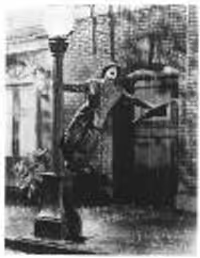only tenors for lead roles now?
#25re: only tenors for lead roles now?
Posted: 1/17/05 at 2:28pm
Dreamcatcher, it's worth the investment to spend a little more on a great teacher, if you are getting more out of each lesson. Not all teachers are the same. Often, there is a reason that they are so expensive and in so much demand. Meet with a bunch of them and try them and see which one you like best.
Teth - absolutly you can expand your range. Perhaps your teacher doen't know how to do that. Just as I described current women's voice tecnique, the same goes for men. It's a very convincing mix. ex: Sam Harris, Billy Porter, Gavin Creel. There is no reason other then your teacher doesn't know this kind of tech. that you shouldn't be able to do that.
#26re: only tenors for lead roles now?
Posted: 1/17/05 at 2:32pm
Oh thanks then! At least now I know I don't have to give up hope on ever singing higher than a G.
Actually, I think my teacher wants to me to work on being able to sing G regularly first (cause there are days when I can't hit it...I think it's a mental thing though...if that makes any sense).
Updated On: 1/17/05 at 02:32 PM
#27re: only tenors for lead roles now?
Posted: 1/17/05 at 2:33pm
Teth - that depends on whether it is your ACTUAL range or all you think you're capable of.
Example: I used to sing alto and balked at anything above E. 6months with my singing teacher & I'm first soprano (up to highB - C on a good day!) and loving it! I've always had the ability to hit those notes, I've just never felt I could so stopped myself from going for them - my nerves closed my throat off.
Similarly, we have a lad at our amdram company who classes himself as tenor 2 (2nd tenor - tenor 1, or first tenor, is the higher), but the other day he was singing No-One But You in a silly high key, and even though he was singing quietly & had had to be bullied into it cos he felt it was too high, he sounded FANTASTIC!!! He could easily be a first tenor if he let go of the nerves.
Work with a good singing teacher, who knows when you're going too far and will guide you into the higher notes gradually, and you may well be able to extend your range, if only by a few notes.
#28re: only tenors for lead roles now?
Posted: 1/17/05 at 2:37pm
teth-
is she having you sing the g full voice or does she have you do it softly as well?
#29re: only tenors for lead roles now?
Posted: 1/17/05 at 2:39pm
Thanks for your input.
A lot of times, I think I get scared and think that I won't make it to a certain note. And when I can though, I really feel as though I could go on to a even higher note (don't know if I really can though yet).
#30re: only tenors for lead roles now?
Posted: 1/17/05 at 2:40pm
castration use to work!
my singing teacher is an alumni fro carnegie-Mellon so she has me doing more arias than broadway stuff, and some show peices when i am doing a show in school. She's actually been working on me trying to become a counter-tenor and she wont push low notes because she is a fraid I will lose my tenor range.
Also that G that she has you sing do you use some head voice too?
Teth, sometimes pushing your body into a note can send it louder and bigger too it's all about using your mouth and diaphram!
Updated On: 1/17/05 at 02:40 PM
#31re: only tenors for lead roles now?
Posted: 1/17/05 at 2:41pmI guess my question is, is your teacher developing your head voice. Thae part of your voice somehwere between chest and falsetto. That's how you get flexibility in the voice and that's how notes above G are easy...
#32re: only tenors for lead roles now?
Posted: 1/17/05 at 2:44pm
marco-
Developing the lower range, strengthens the upper range, because it's balanced. I don't get her theory.
#33re: only tenors for lead roles now?
Posted: 1/17/05 at 2:58pmshe's off her rocker anyway. Lol, I don't know...We got so caught up in college crap that I barely have fun with any of the stuff I sing, its all ultra classical.
#34re: only tenors for lead roles now?
Posted: 1/17/05 at 3:08pm
I think my teacher talks about my head voice...although whether I'm actually using it is another thing (not really sure myself). I guess when I sing up to a G, I feel as thouh it's a zone that's borderlining falsetto?...maybe. I don't know. LOL
Thanks for the tip.
#35re: only tenors for lead roles now?
Posted: 1/17/05 at 3:09pm
She's actually been working on me trying to become a counter-tenor and she wont push low notes because she is a fraid I will lose my tenor range.
To be quite frank, if she is afraid of that, I strongly suggest a new voice teacher.
The opposite of creation isn't war, it's stagnation.
#36re: only tenors for lead roles now?
Posted: 1/17/05 at 3:10pm
Yeah, she's a real good teacher. Just kind of nutty, and...well insane. Lol.
Also teth, you'll feel it less in your chest and more in your head..hence head voice! Lol.
#37re: only tenors for lead roles now?
Posted: 1/17/05 at 3:15pm
I'm a huge believer in the Seth Riggs vocal technique.
Seth's most radical theory is that there is no difference between your "chest" and your "head" voice. Using his exercises, you can completely eliminate any "break" in your voice, and you will gain at least four notes on both the top and bottom of your range.
Seth has a network of accredited teachers teaching his technique all over the country. He has also published a book and CD which contain his exercises, called "Singing for the Stars."
Performers who rave about the Seth Riggs technique include Bette Midler, who insists that she had no control over her voice until she started working with Seth.
#38re: only tenors for lead roles now?
Posted: 1/17/05 at 3:20pmThanks again for the advice bbroadwaybb. It really helps since I had no idea where to begin.
#39re: only tenors for lead roles now?
Posted: 1/17/05 at 3:33pm
Dreamcatcher - you're welcome. It's really important that you feel comfortable with the teacher. You want a teacher who will make you feel good and encourage you. It can be damaging other wise.
Seth Riggs, who Veuve is talking about, I believe he's in LA, so you might want to check him out. But correct me if I'm wrong, Veuve, but I think he's massively expensive. Something in the multiple hundred of dollars per lesson.
#40re: only tenors for lead roles now?
Posted: 1/17/05 at 3:46pm
Yes, bbroadwaybb, Seth is in LA and he charges $350 for a half hour lesson.
But he has trained a network of teachers across the country to teach his technique, at a significantly lower price. I've never actually studied with Seth (I certainly can't afford it), although I have attended master classes with him. But I did study with three of his accredited teachers, in New York and Los Angeles.
Before I discovered the Riggs technique, I had taken classical voice lessons from dozens of teachers across the country. None of them were very useful.
At my FIRST lesson with a Riggs teacher, I had a breakthrough, and my voice improved leaps and bounds in a really short time period after using his vocal exercises.
Everyone's instrument is different, and I can't guaranty that Riggs' technique will work for everyone. I just wanted to explain my experience with it, and share what a tremendously helpful experience it was for me.
Updated On: 1/17/05 at 03:46 PM
#41re: only tenors for lead roles now?
Posted: 1/17/05 at 3:49pm
Well if the def of head voice is only that, then I guess so.
My vocal coach uses his own method I suppose. Here's his website: http://www.geocities.com/broadwaybelters/
#42re: only tenors for lead roles now?
Posted: 1/17/05 at 3:50pmThe technique you're describing - the "one voice" technique is what all of the top singing teachers are currently teaching. They all have different methods of getting to this result.
#43re: only tenors for lead roles now?
Posted: 1/17/05 at 3:55pmwouldn't it be better to establish a classical voice style and then transfer over?
#44re: only tenors for lead roles now?
Posted: 1/17/05 at 3:55pmteth- if you feel you're improving with this guy - then great. But a really good teacher makes you progress very quickly. I don't know if you are or not. It's hard tp tell what your teacher does from this description.
#45re: only tenors for lead roles now?
Posted: 1/17/05 at 4:00pmI don't think that there's one way of doing it. Some people start classically and some don't.
B.B. Wolf
Broadway Legend Joined: 7/26/04
#46re: only tenors for lead roles now?
Posted: 1/17/05 at 4:01pmMarco, it depends on what you are intending to accomplish in the musical world. My background is a mishmash of classical and pop, but I study exclusively classically now. My feeling is, the "pop" sound will always be there in my voice so I can revert back to that whenever I feel like it, but correct technique is what you keeps you afloat on Broadway AND what allows you to do the Golden Age repertoire.
#47re: only tenors for lead roles now?
Posted: 1/17/05 at 4:02pm
If anyone is interested, you can go to Seth's website:
www.sethriggs.com
There's a full list of his accredited teachers all over the country, and lots of information about his technique, as well as endorsements from celebrities he's taught, which range from Josh Groban to Bernadette Peters.
In LA, I studied with Richard Balin, who was terrific. In New York, I studied with Badiene Magaziner, who is even better.
There's also information about Seth's master classes, which can be a great (and affordable) introduction to his technique.
Updated On: 1/17/05 at 04:02 PM
#48re: only tenors for lead roles now?
Posted: 1/17/05 at 4:04pmI recommend Liz Caplan. www.lizcaplan.com
#49re: only tenors for lead roles now?
Posted: 1/17/05 at 4:06pm
Well I guess I do feel an improvement.
The problem is probably partially due to the fact that I only go to a lesson every 3 weeks or so. In between, there's not really a "set" practice routine for me to follow (he doesn't believe in directly telling what his students should be doing).
Thanks guys. Now I know what things I want to work on in my next lesson.
Updated On: 1/17/05 at 04:06 PM
Videos







